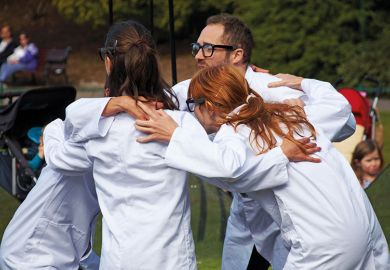Making science easier to understand encourages people to ignore expert advice from scientists, a new study suggests.
While making science as accessible as possible to the general public is widely viewed as an entirely positive endeavour, researchers in Germany found there are some potential downsides.
Reading easy-to-follow articles on science made people overrate their understanding of a complex technical subject, according to a recent paper published in the journal Public Understanding of Science.
Those who had just read a science article aimed at a general readership were also less likely to seek out or rely on the opinion of a scientist when answering questions on complex health issues, the study found.
As part of the experiment, some 73 Germans with no scientific training were asked to read two articles from online tabloid magazines on science and two pieces from magazines addressed at an expert audience.
Participants were then asked how they would advise a friend who had approached them for help relating to a health issue on the same subject as the articles they had just read.
While the information contained in lay audience articles was far from extensive, the participants were more likely to “trust more in their own judgment…and display a weaker desire to consult a more knowledgeable person than after reading expert audience articles”, explains the article, titled “When science becomes too easy: science popularization inclines laypeople to underrate their dependence on experts”.
“Reading simplified depictions may induce the impression of having already obtained a fairly complete picture of the issue at hand,” suggests the paper by Lisa Scharrer, Yvonne Rupieper, Marc Stadtler and Rainer Bromme from the University of Münster’s Institute for Psychology.
Those who read articles aimed at an expert audience are less likely to make a firm recommendation without deferring to expert advice, the study also found.
“We in no way deny that informing laypeople about scientific topics that impact strongly on their daily lives is an important endeavour,” states the paper.
“However, this should not be achieved at the price of having laypeople overlook the limitations of their own epistemic capabilities,” it adds.
The “overly ready reliance on [laypeople’s] own evaluation capabilities” is described in the paper as a “real-life concern” and comes in the context of debate about the position of “experts” in modern society.
While scientists and other academics should continue to further the basic understanding of science, the paper argues, it also says that “formal science education should facilitate students’ awareness of the fact that making reliable judgments often requires deference to scientific experts”.
Register to continue
Why register?
- Registration is free and only takes a moment
- Once registered, you can read 3 articles a month
- Sign up for our newsletter
Subscribe
Or subscribe for unlimited access to:
- Unlimited access to news, views, insights & reviews
- Digital editions
- Digital access to THE’s university and college rankings analysis
Already registered or a current subscriber?








